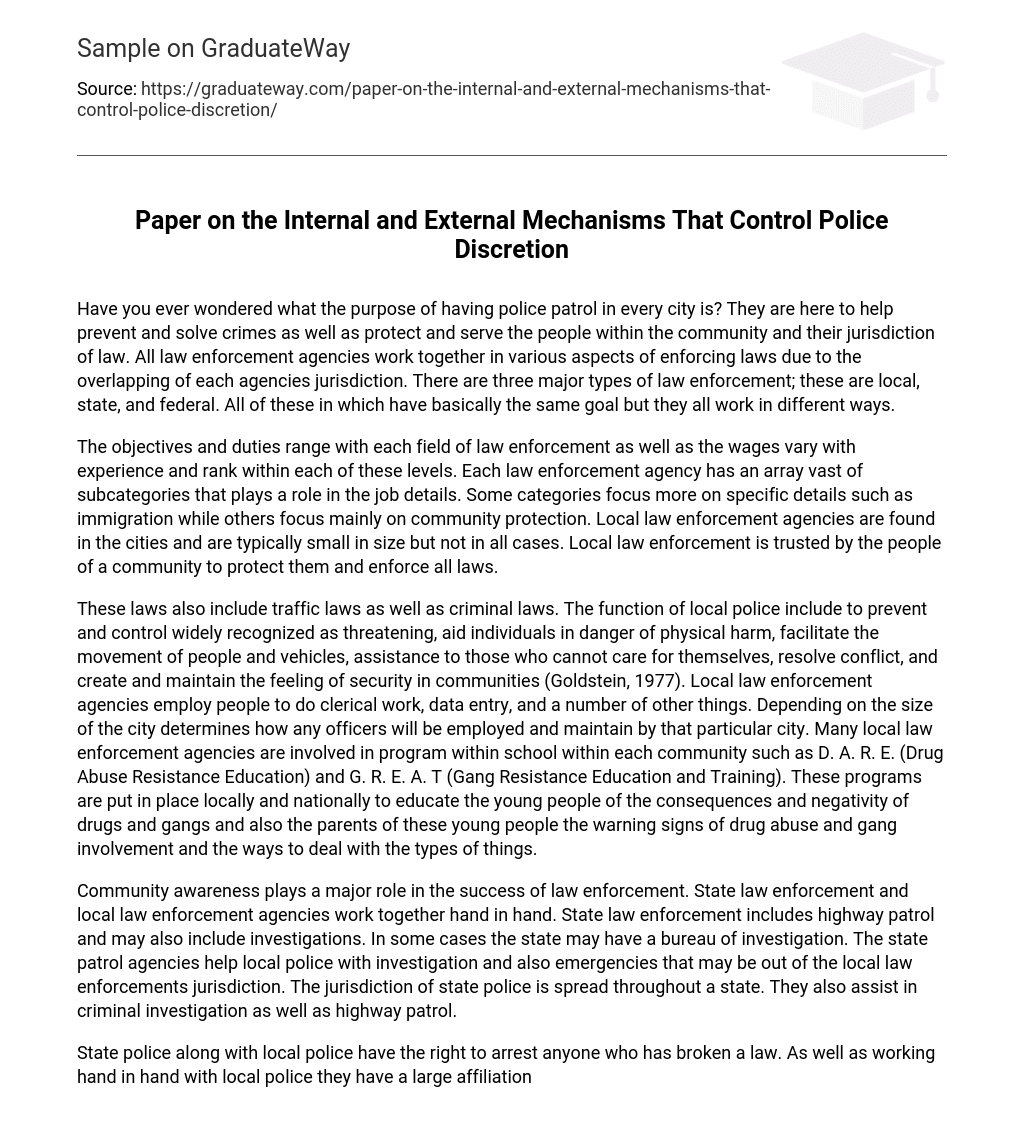The police patrol is crucial in all cities as it fulfills various important roles. These include preventing and resolving crimes, ensuring community safety, and enforcing the law within their designated areas. It is essential for different law enforcement agencies to cooperate due to the overlapping of their jurisdictions. Law enforcement can be categorized into local, state, and federal levels, each with their own methods but ultimately working towards a common goal.
The duties and objectives differ in various fields of law enforcement, and the salaries also vary based on experience and rank within each level. Each law enforcement agency comprises numerous subcategories that contribute to the job responsibilities. Some categories specialize in areas like immigration, while others prioritize community safety. Local law enforcement agencies are present in cities, usually with a small size, although there are exceptions. These agencies are entrusted by the community to safeguard and enforce all laws.
The laws encompassed by local law enforcement agencies include traffic laws and criminal laws. These agencies have the responsibility of preventing and controlling recognized threats, assisting individuals in physical danger, facilitating the movement of people and vehicles, aiding those unable to care for themselves, resolving conflicts, and establishing and maintaining community security (Goldstein, 1977). In addition to these tasks, local law enforcement agencies hire individuals for various responsibilities such as clerical work and data entry. The number of officers employed by a city depends on its size. Many local law enforcement agencies are involved in programs within schools and communities like D.A.R.E. (Drug Abuse Resistance Education) and G.R.E.A.T (Gang Resistance Education and Training), which aim to educate young people nationally about the negative consequences of drugs, gangs, signs of drug abuse, gang involvement along with strategies for dealing with such issues.
Community awareness is essential for efficient law enforcement. Collaboration occurs between state and local law enforcement agencies, which include highway patrol and investigations. State law enforcement may also have a bureau of investigation. In situations that extend beyond the jurisdiction of local law enforcement, state patrol agencies assist local police with investigations and emergencies. State police possess authority statewide and play a role in criminal investigations, as well as fulfilling their responsibilities in highway patrol.
State and local police, as well as federal agencies, possess the authority to apprehend individuals who violate laws. They play a critical role in upholding national security, addressing immigration matters, and working closely with local law enforcement. Patrol officers are responsible for identifying and surveilling criminals while adhering to specific laws and guidelines.
Patrol officers and other law enforcement personnel actively engage in court proceedings while also focusing on preventive patrol to deter illegal activities. They provide support and assistance to individuals in dangerous situations, playing a crucial role on highways and major roads that necessitates regular communication about their duties. Like other law enforcement agents, they are responsible for ensuring the functionality and operational status of all equipment.
Officers from multiple law enforcement agencies, such as Customs and Border Control, the FBI, the Secret Service, the Bureau of Alcohol and Tobacco, the US Armed Forces, the CIA, and the Transportation Security Administration’s Federal Air Marshals, are divisions within the federal government. Their main objective is to prevent, detect, and investigate crimes rather than predict equipment failure or conduct public assembly checks.
The roles and functions of law enforcement agents involve collaborating in various ways to apprehend criminals and reduce the likelihood of criminal activity. While local, state, and federal law enforcement have distinct responsibilities, their common objective is to safeguard and assist the people of the United States, as well as those residing in specific states and communities. Local police officers are exclusively assigned to their respective cities.
The objective is to prevent and halt any harm to the community by apprehending individuals involved in criminal or delinquent activities. Local agencies collaborate on drug and gang resistance programs in schools, aiming to raise awareness among young people and their parents about the incidents occurring within every community. They also work alongside state police for patrolling purposes. State police are responsible for patrolling highways and assisting with state patrol operations. The primary goal of all these agencies is to conduct preventive patrols as a means of averting potential crimes.
Completing applications for local, state, and federal jobs necessitates comprehensive measures. These applications aim to guarantee the recruitment of competent individuals for law enforcement purposes. Employing someone with a criminal background or extensive criminal records would be imprudent. An applicant’s involvement in criminal activities can jeopardize their capacity to exercise sound judgment and uphold integrity as a law enforcement officer.





